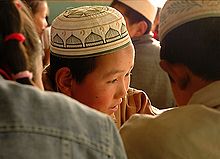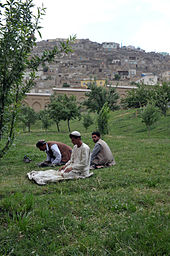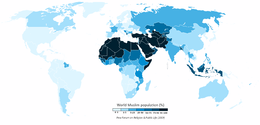- Muslim
-
This article is part of the series: Islam 
A Muslim, (Arabic: مسلم) also spelled Moslem,[1] is an adherent of Islam, a monotheistic, Abrahamic religion based on the Quran, which Muslims consider the verbatim word of God as revealed to prophet Muhammad. "Muslim" is the Arabic term for "submitter" (one who submits to God).
Muslims believe that God is one and incomparable.[2] Muslims also believe that Islam is the complete and universal version of a primordial faith that was revealed at many times and places before, including through the prophets Abraham, Moses and Jesus.[3] Muslims maintain that previous messages and revelations have been partially changed or corrupted over time,[4] but consider the Quran to be both unaltered and the final revelation from God—Final Testament.[5]
Most Muslims accept as a Muslim anyone who has publicly pronounced the Shahadah (declaration of faith) which states, "I testify that there is none worthy of worship except God and I testify that Muhammad is a Messenger of God." Their religious practices include daily prayers (salat), fasting during Ramadan (sawm), almsgiving (zakat), and the pilgrimage to Mecca (hajj) at least once in a lifetime.[6][7]
Currently, the most up-to-date reports from an American think tank and PBS have estimated 1.2 to 1.57 billion Muslims populate the world, or about 20% of an estimated 2009 world population of 6.8 billion,[8] with 60% in Asia and 20% of Muslims living in the Middle East and North Africa.[9][10][11][12]
Contents
Etymology
A muslim (Arabic: مسلم, IPA: [ˈmʊslɪm]; English /ˈmʌzlɨm/, /ˈmʊzlɨm/, /ˈmʊslɨm/ or moslem /ˈmɒzlɨm/[13]) is the participle of the same verb of which islām is the infinitive.[14] A female adherent is a muslima (Arabic: مسلمة). The plural form in Arabic is muslimūn (مسلمون), and its feminine equivalent is muslimāt (مسلمات). The Arabic form muslimun is the stem IV participle[15] of the triliteral S-L-M "to be whole, intact".
Other words for Muslim
The ordinary word in English is "Muslim". It is sometimes transliterated as "Moslem", which is an older spelling.[16] “Submitter” is the English equivalent of the Arabic word “Muslim”.[17]
Until at least the mid-1960s, many English-language writers used the term Mohammedans or Mahometans.[18] Although such terms were not necessarily intended to be pejorative, Muslims argue that the terms are offensive because they allegedly imply that Muslims worship Muhammad rather than God.[19]
Variant forms of this word are still used by many Indo-European and Turkic languages. These words are similar to the French, Spanish, Portuguese, Italian, Russian, Turkish, Bosnian, Persian, Kurdish, and Hindi words for "Muslim".[citation needed]
Meaning
In defining Muslim, the mystic Ibn Arabi said:
"A Muslim is a person who has dedicated his worship exclusively to God...Islam means making one's religion and faith God's alone.[20]
The Qur'an is clear on promulgating that every prophet preached the same faith, which centered on the worship of God.[citation needed]
Used to describe earlier prophets in the Qur'an
The Qur'an describes many prophets and messengers as well as their respective followers as Muslim: Adam, Noah, Abraham, Jacob, Moses and Jesus and his apostles are all confirmed as being Muslim by the Qur'an. The Qur'an states that these men were Muslims because they submitted to God, preached His message and upheld His values, which included praying, charity, fasting and pilgrimage. Thus, in Surah 3:52 of the Qur'an, Jesus’ disciples tell Jesus, "We believe in God; and you be our witness that we are Muslims (wa-shahad be anna muslimūn)." In Muslim belief, before the Qur'an, God had given the Torah to Moses, the Psalms to David and the Gospel to Jesus, who are all considered important Muslim prophets.
Demographics
About 13% of Muslims live in Indonesia, the largest Muslim country,[21] 25% in South Asia,[21] 20% in the Middle East,[21][22] 2% in Central Asia, 4% in the remaining South East Asian countries, and 15% in Sub-saharan Africa.[21] Sizable communities are also found in China and Russia, and parts of the Caribbean. Converts and immigrant communities are found in almost every part of the world.
See also
References and notes
- ^ http://www.thefreedictionary.com/Muslim
- ^
- Quran 51:56
- "God". Islam: Empire of Faith. PBS. http://www.pbs.org/empires/islam/faithgod.html. Retrieved 2010-12-18. "For Muslims, God is unique and without equal."
- ^ "People of the Book". Islam: Empire of Faith. PBS. http://www.pbs.org/empires/islam/faithpeople.html. Retrieved 2010-12-18.
- ^ See: * Accad (2003): According to Ibn Taymiya, although only some Muslims accept the textual veracity of the entire Bible, most Muslims will grant the veracity of most of it. * Esposito (1998), pp.6,12* Esposito (2002b), pp.4–5* F. E. Peters (2003), p.9* F. Buhl; A. T. Welch. "Muhammad". Encyclopaedia of Islam Online.* Hava Lazarus-Yafeh. "Tahrif". Encyclopaedia of Islam Online.
- ^ Submission.org, Quran: The Final Testament, Authorized English Version with Arabic Text, Revised Edition IV,ISBN 0972920927, p. x.
- ^ Hooker, Richard (July 14, 1999). "arkan ad-din the five pillars of religion". United States: Washington State University. http://www.wsu.edu/~dee/GLOSSARY/5PILLARS.HTM. Retrieved 2010-11-17.
- ^ "Religions". The World Factbook. United States: Central Intelligence Agency. 2010. https://www.cia.gov/library/publications/the-world-factbook/fields/2122.html. Retrieved 2010-08-25.
- ^ PBS – Islam Today (Islam, followed by more than a billion people today, is the world's fastest growing religion and will soon be the world's largest. The 1.2 billion Muslims make up approximately one quarter of the world's population, and the Muslim population of the United States now outnumbers that of Episcopalians...)
- ^ "Mapping the Global Muslim Population". PewForum.org The report, by the Pew Forum on Religion and Public Life, took three years to compile, with census data from 232 countries and territories. http://pewforum.org/docs/?DocID=450. Retrieved 2009-11-08.
- ^ Tom Kington (2008-03-31). "Number of Muslims ahead of Catholics, says Vatican". The Guardian. http://www.guardian.co.uk/world/2008/mar/31/religion. Retrieved 2008-11-17.
- ^ "Muslim Population". IslamicPopulation.com. http://www.islamicpopulation.com/. Retrieved 2008-11-17.
- ^ "Field Listing – Religions". https://www.cia.gov/library/publications/the-world-factbook/fields/2122.html. Retrieved 2008-11-17.
- ^ dictionary.reference.com: muslim pronunciation: /ˈmʌzlɨm/, /ˈmʊzlɨm/, /ˈmʊslɨm/; moslem /ˈmɒzləm/, /ˈmɒzləm/
- ^ Burns & Ralph, World Civilizations, 5th ed., p. 371
- ^ also known as "infinitive", c.f. Burns & Ralph, World Civilizations, 5th ed., p. 371
- ^ "''Reporting Diversity'' guide for journalists" (PDF). http://www.communities.gov.uk/documents/communities/pdf/151921.pdf. Retrieved 2010-03-17.
- ^ "Who are Submitters and what is Submission?". Masjidtucson.org. http://www.masjidtucson.org/submission/submitter_and_submission.html. Retrieved 2011-01-25.
- ^ See for instance the second edition of A Dictionary of Modern English Usage by H. W. Fowler, revised by Ernest Gowers (Oxford, 1965)).
- ^ Gibb, Sir Hamilton (1969). Mohammedanism: an historical survey. Oxford University Press. p. 1. "Modern Muslims dislike the terms Mohammedan and Mohammedanism, which seem to them to carry the implication of worship of Mohammed, as Christian and Christianity imply the worship of Christ."
- ^ Commentary on the Qur'an, Razi, I, p. 432, Cairo, 1318/1900
- ^ a b c d Miller, Tracy, ed (10 2009) (PDF). Mapping the Global Muslim Population: A Report on the Size and Distribution of the World’s Muslim Population. Pew Research Center. pp. 8–9, 17–19. http://pewforum.org/Muslim/Mapping-the-Global-Muslim-Population.aspx. Retrieved 2009-10-08.
- ^ Esposito, John L. (2002-10-15). What everyone needs to know about Islam. Oxford University Press. p. 21. ISBN 9780195157130. and Esposito, John (2005). Islam : the straight path (Rev. 3rd ed., updated with new epilogue. ed.). New York: Oxford University Press. pp. 2, 43. ISBN 9780195182668.
External links
- Islamic directory for Muslims Find Muslim Owned businesses, Masjids (Mosques) and Islamic Centers all over the world.
- Muslim Population in Countries with different Alphabets
Categories:- Islam
- Muslims
- Religious identity
- Quranic words and phrases
Wikimedia Foundation. 2010.



